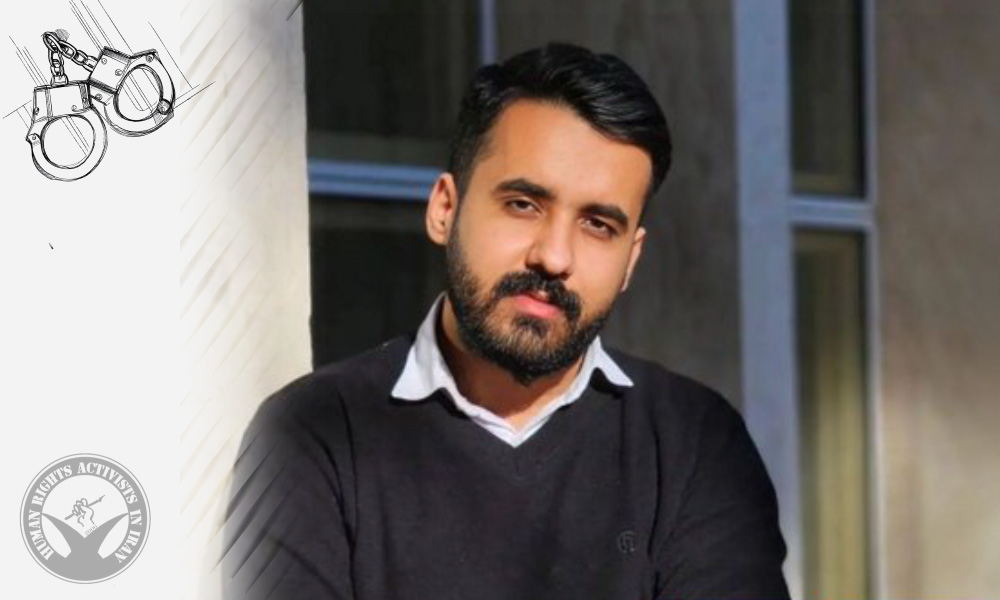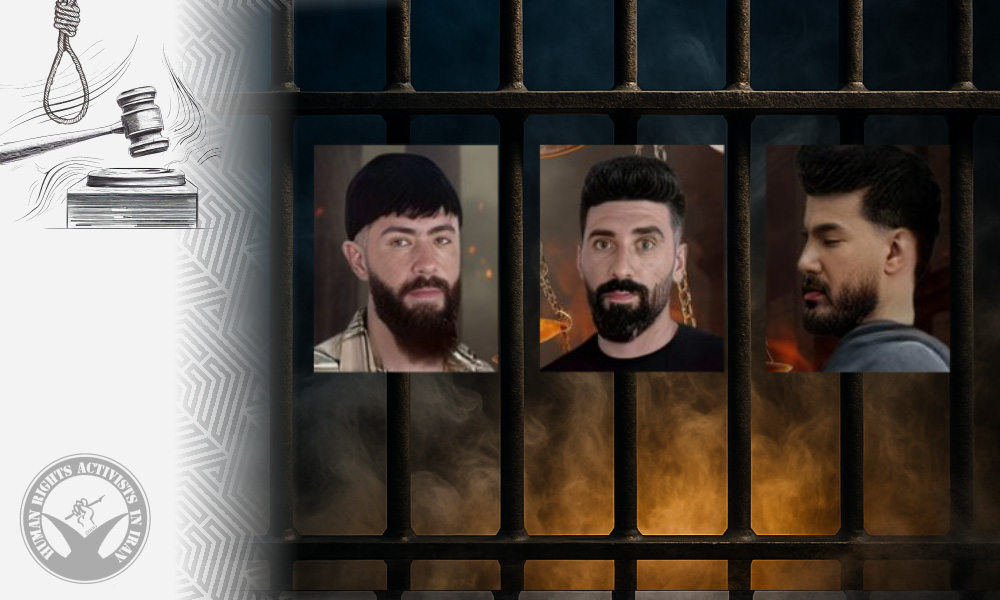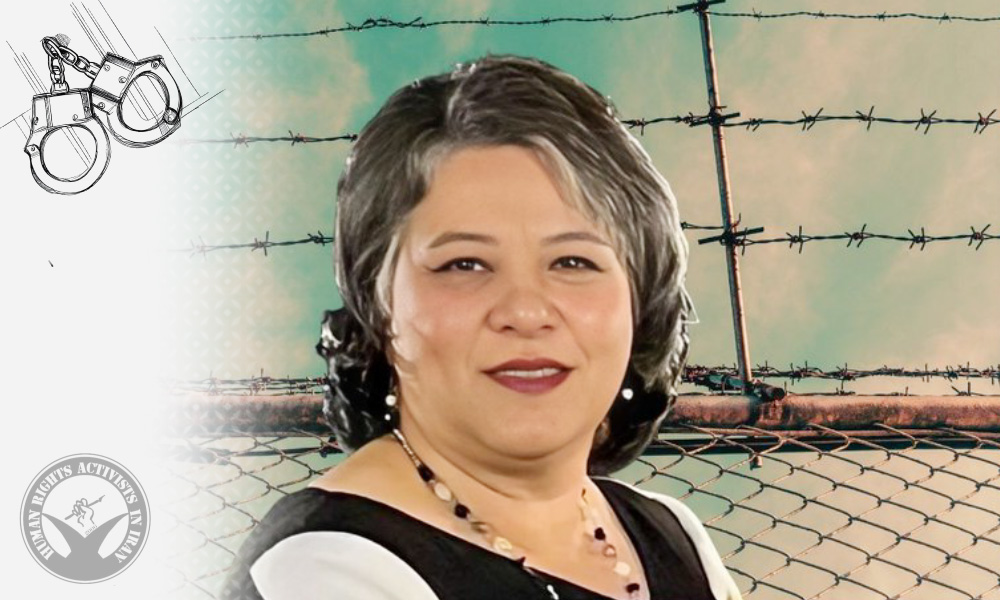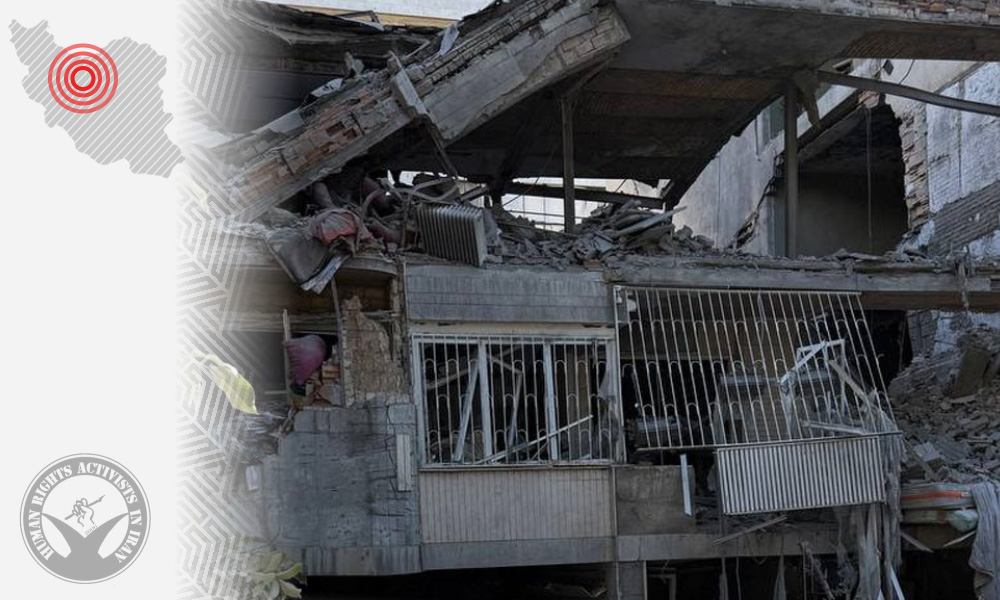HRANA News Agency – Yesterday, June 24, a ceasefire agreement between Iran and Israel took effect. In the lead-up to the truce, the Israeli military carried out strikes for twelve consecutive days, targeting multiple military and civilian sites and expanding the conflict’s reach to 26 provinces across Iran.
Since the onset of the attacks, Iranian security forces have arrested at least 286 citizens for expressing opinions related to recent events, while an additional 537 individuals have been detained on security-related charges, including espionage.
The total number of casualties from Israel’s attacks has reached 5,530, including 1,054 dead and 4,476 injured.
Geographic Scope and Course of Events
Over the past 12 days, until the announcement of the ceasefire, Israeli attacks targeted Iran’s infrastructure, military and civilian facilities, residential areas, and industrial zones across 26 provinces.
Yesterday, prior to the announcement of the ceasefire on the twelfth day of the conflict, the provinces of Fars, Tehran, West Azerbaijan, Gilan, and Alborz were targeted.

The Governor of Tehran stated that, in the early hours of yesterday, 12 locations in Tehran city and province were targeted by Israeli attacks.
The provinces that have been directly attacked since June 13 are as follows:
Tehran, East Azerbaijan, West Azerbaijan, Ardabil, Isfahan, Ilam, Kermanshah, Markazi, Hamedan, Fars, Khuzestan, Kurdistan, Alborz, Zanjan, Bushehr, Qazvin, Gilan, Hormozgan, Qom, Razavi Khorasan, Chaharmahal and Bakhtiari, Kerman, Semnan, Mazandaran, Yazd, and Golestan.
The Latest Casualty and Damage Figures
Since the beginning of Israel’s military attacks on Iranian soil, thousands of citizens have been killed or injured. The military or civilian status of some of the victims is still under investigation. According to aggregated figures announced by official bodies such as the Ministry of Health, the Red Crescent, and provincial authorities, as of 12 PM Tehran time on June 24, the total number of casualties has reached 5,356.
According to Hossein Kermanpour, head of the Public Relations and Information Center of the Ministry of Health, among these, 610 people have died and 4,746 have been injured. Additionally, 971 people remain hospitalized, 3,436 have been discharged after treatment, and 255 received on-site medical care. So far, 687 surgeries have been performed on the wounded.
Among the dead, 49 are women, including two pregnant women in Tehran and Isfahan, and 13 are children, the youngest being only two months old. Among the injured, there are 185 women and 65 children under the age of 20; the youngest known injured person is a three-year-old child.
Kermanpour also reported that 25 medical personnel have been affected, including 20 injured and 5 killed. The attacks have also inflicted considerable damage on healthcare infrastructure, including 9 ambulances, 7 hospitals, 4 health centers, and 6 emergency stations.
Earlier, Mohammadreza Zafarghandi, the Minister of Health, had stated that 95% of the deceased died under the rubble, while only 5% passed away after being transferred to hospitals. He did not comment on whether the victims were military personnel or civilians.
In terms of relief efforts, the spokesperson for the Red Crescent Society announced that its relief workers have so far transported 288 injured individuals, treated 109 on site, and provided emergency shelter for 1,087 people. The Deputy Minister of Nursing also reported that at least 10 ambulances were directly attacked during relief operations, leading to the deaths of 4 medical personnel.
In Ahvaz, the president of Ahvaz Jundishapur University of Medical Sciences reported the highest death toll over two consecutive days, with approximately 200 people injured.
The Governor of Tehran also reported the complete destruction of more than 120 residential units and serious damage to over 500 others in the province. According to him, public infrastructure, including water, electricity, gas, and even medical centers, were targeted in Tehran.
In Gilan Province, according to the Deputy Governor, last night’s attacks on Astaneh Ashrafieh resulted in 16 deaths, 33 injuries, and the complete destruction of 4 residential units.
Finally, the Iranian Medical Council announced that five doctors have lost their lives in these attacks.
It should be noted that, in line with its commitment to maximum transparency and independent reporting, HRANA does not rely solely on government figures for its statistics.
According to the latest updates from HRANA News Agency, based on information gathered through its network of volunteers and independent, non-governmental sources, and incorporating newly received documents and yesterday’s reports, the casualty figures are as follows:
▫️Civilians:
Killed: 417
Injured: 2,072
▫️Military personnel:
Killed: 318
Injured: 256
▫️Unspecified:
Killed: 319
Injured: 2,148
Total fatalities: 1,054
Total injuries: 4,476
Total casualties: 5,530 people

Israeli Attacks on Civilian Infrastructure
As on previous days, multiple civilian areas across the country came under attack yesterday, with several residential buildings in Gilan and two hospitals in Tehran sustaining damage.
The Deputy Minister of Nursing at the Ministry of Health reported that Motahari Burn Hospital and Labbafi Nejad Hospital in Tehran were struck during the overnight attacks. Shahid Motahari Hospital was fully evacuated, and patients were transferred to other medical facilities. Portions of Labbafi Nejad Hospital were also damaged, prompting the relocation of patients.
Strikes were also reported yesterday in the cities of Tehran, Karaj, Rasht, Urmia, Astaneh Ashrafieh, and Lahijan.
One of the most significant attacks on civilian infrastructure occurred at Evin Prison. The Judiciary’s spokesperson announced that the prison was hit during family visiting hours. Asghar Jahangir stated that part of the administrative building was destroyed, leading to the deaths of “some of our colleagues and members of the public.”
Following the attack, the Prisons Organization announced that Evin prisoners have been transferred to other facilities within Tehran province.
A source close to one Evin prisoner’s family told HRANA that most inmates were moved to Greater Tehran Prison. The source described severe overcrowding: “Each prisoner has been given only one blanket. Conditions are so cramped that prisoners don’t even have space to sit.”
Furthermore, yesterday, air defense activity was reported in cities including Shiraz, Tehran, Urmia, Rasht, Babol, Tabriz, and Babolsar.
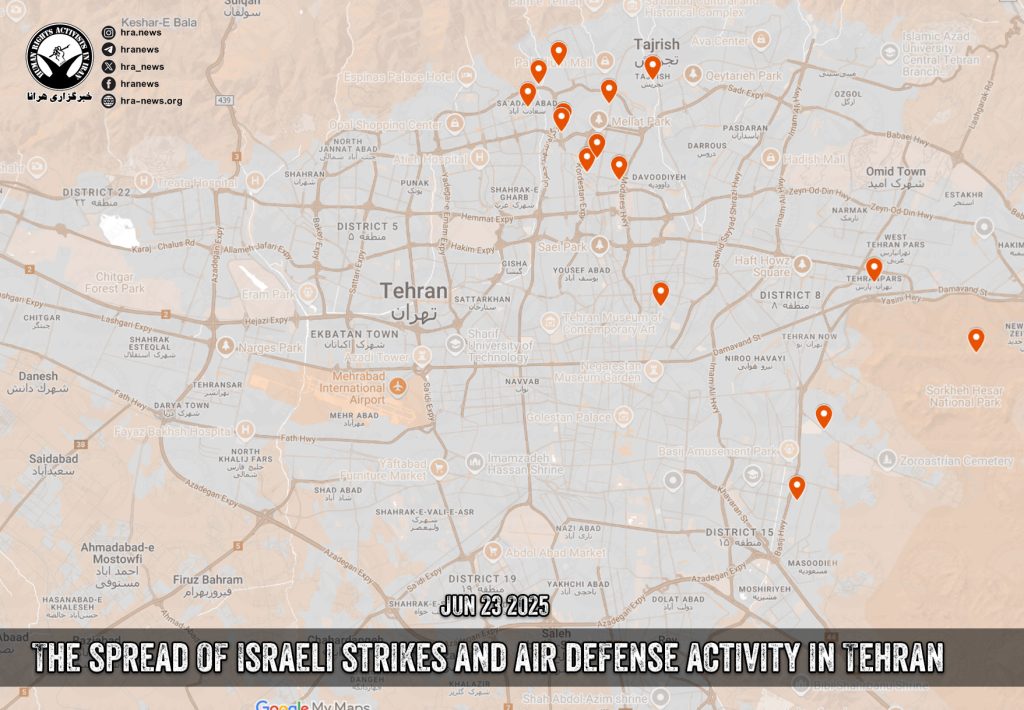
Methodological Note: The classification of targeted locations in this report as “military” or “civilian” is based on publicly available information, visible indicators, and testimonies from local residents. A definitive determination of the nature of these sites requires further verification through official documents, satellite imagery, and comprehensive analysis, which are currently not accessible. Therefore, this categorization is provisional and intended to provide an initial overview rather than a conclusive judgment about the nature of the targets.
Israeli Attacks on Iran’s Military Infrastructure
In addition to civilian areas, yesterday Israel targeted the Parchin missile site.
The Joint Headquarters of the IRGC in Kolahdouz Square, Tehran, was also among the military targets struck by the Israeli army prior to the ceasefire announcement.
Arrests and Crackdown on Citizens
Baha’i citizens in Iran continue to report to HRANA an escalation of security crackdowns against this religious minority following Israel’s attacks on Iran. So far, HRANA has received reports of one arrest and home searches of 20 Baha’i citizens in the cities of Baharestan, Qaemshahr, and Bushehr.
Meanwhile, yesterday the Chief Prosecutor of Qazvin Province announced that 19 legal cases have been opened for individuals arrested in recent events. HRANA had previously reported the arrest of 16 of these individuals.
It has also been documented that Morteza Asadi, a political science researcher, was arrested without a court warrant at his home by security agents on June 20. His and his wife’s personal belongings were confiscated. After three days, his family remains unaware of his whereabouts or health condition. He suffers from a digestive illness and does not have access to his necessary medication.
Including the most recent arrests, in the past 12 days, 286 Iranian citizens have been detained for their online activity and for posting content related to Israel’s attack on Iran.
Security-Related Arrests
In addition to those detained for expressing opinions or political activities, there is another category of arrestees about whom little information is available. These individuals are typically accused by security agencies of more serious charges such as espionage, armed activities, terrorism, and similar offenses. The mere filing of such charges, given the Iranian government’s history of labeling opponents in order to suppress dissent, cannot by itself serve as a basis for judgment. Fair trial and due process remain the only standards for human rights organizations to assess and validate such accusations.
Yesterday, the Deputy for Public Relations of the IRGC in Hamedan Province reported the arrest of 6 individuals in the cities of Razan, Nahavand, and Hamedan, accusing them of espionage for Israel. The head of the Hamedan Judiciary also stated that 24 cases have been opened for individuals allegedly involved in espionage, sending information, photos, and videos to Israel.
The deputy police chief of Kermanshah Province reported the arrest of two individuals in this city, accusing them of “disturbing public opinion” through online posts. At the same time, the Chief Prosecutor of Kermanshah stated that since the beginning of the conflict, 115 people have been arrested, 54 of whom have since been released on bail. According to him, only a small number face espionage charges, while the majority are accused of propaganda against the regime.
Yesterday, there was also a report of the arrest of a European national in Hormozgan. The semi-official Fars news agency reported that this individual was detained “while spying on sensitive and military sites.”
Additionally, the Chief Prosecutor of Sistan and Baluchestan Province announced the arrest of several individuals in this province, claiming that a “large shipment of American weapons and ammunition” was seized from them.
On the other hand, state media released a video yesterday showing the arrest of 6 individuals in Tehran, in which the detainees, under unclear circumstances, confess to cooperating with Israeli intelligence.
With these new cases, the total number of individuals arrested on security charges by law enforcement and intelligence agencies since the start of the military conflict has reached 537.
New Legislative Proposals to Increase Penalties
In this context, yesterday, members of parliament approved an emergency bill to increase the punishments for citizens arrested on espionage charges. yesterday, Judiciary spokesperson Ali Asghar Jahangir stated: “If we wanted to prosecute many of those we arrested during the war with Israel under the existing espionage law, we would have faced restrictions and limitations. However, the parliament has now given us greater legal latitude.”
Communication Disruptions
Yesterday marks the sixth day of internet disruptions in Iran. Although there has been slight improvement in connectivity, the country remains largely offline. Citizens continue to rely on VPNs to access global social networks.
The news outlet Ham-Mihan, citing its sources, reported that Telegram may soon be unblocked, while WhatsApp will remain banned due to its alleged involvement in espionage for Israel.
International Reactions: Global Consensus on Restraint and Concern over Escalation
Yesterday, the UN Human Rights Office condemned Israel’s attack on Evin Prison as a “gross violation” of international law. The spokesperson stated: “Evin Prison is not a military target, and striking it constitutes a serious breach of international humanitarian law.”
The UN fact-finding mission also reported yesterday that Israel’s strike on a residential complex in Tehran had resulted in dozens of fatalities. According to the mission, these attacks violate international humanitarian law and have so far led to the deaths of three Red Cross staff members in Tehran. The mission expressed concern that Israel may be failing to uphold the principle of distinction between military and civilian targets.
 |  |  |
Astaneh-ye Ashrafiyeh
Gilan Province | Astaneh-ye Ashrafiyeh
Gilan Province | Astaneh-ye Ashrafiyeh
Gilan Province |
 |  |  |
A residential building in
Astaneh Ashrafieh | Bokharest Street in District 6 of Tehran | Fire in Tehran following
the crash of a Hermes drone |
 |  |  |
Fire in Tehran following
the crash of a Hermes drone | Khajeh Nasir neighborhood – Tehran | Hakimiyeh neighborhood – Tehran |
 |  |  |
| District 7 of Tehran | Tehran | East Tehran |
 |  |  |
| Tehransar neighborhood – Tehran | Pich Smeiran neighborhood -Tehran | Pasdaran neighborhood -Tehran |
|  | |
| Babolsar | |





